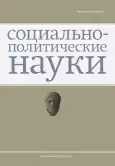Problems Formation of Ideological Stability of Cadets of Educational Organizations of the Ministry of Internal Affairs of Russia
- Authors: Talynev V.E.1, Andrienko O.Y.1, Protasov Y.S.1
-
Affiliations:
- Voronezh institute of the Ministry of Internal Affairs of Russia (VI the Ministry of Internal Affairs of Russia)
- Issue: Vol 12, No 4 (2022)
- Pages: 82-92
- Section: Articles
- URL: https://journal-vniispk.ru/2223-0092/article/view/146991
- DOI: https://doi.org/10.33693/2223-0092-2022-12-4-82-92
- ID: 146991
Cite item
Abstract
Full Text
##article.viewOnOriginalSite##About the authors
Valery E. Talynev
Voronezh institute of the Ministry of Internal Affairs of Russia (VI the Ministry of Internal Affairs of Russia)
Email: v.talynyov@yandex.ru
Dr. Sci. (Sociol.), Associate Professor; Professor at the Department of Socio-humanitarian, Economic and Legal Disciplines Voronezh, Russian Federation
Olesya Yu. Andrienko
Voronezh institute of the Ministry of Internal Affairs of Russia (VI the Ministry of Internal Affairs of Russia)
Email: andrienko-51@mail.ru
Cand. Sci. (Sociol.); specialist of the 2nd category at the Educational Department Voronezh, Russian Federation
Yuri S. Protasov
Voronezh institute of the Ministry of Internal Affairs of Russia (VI the Ministry of Internal Affairs of Russia)
Email: nsavitckii2@mvd.ru
Cand. Sci. (Hist.), Associate Professor; Associate Professor at the Department of Socio-humanitarian, Economic and Legal Disciplines Voronezh, Russian Federation
References
- The Constitution of the Russian Federation. Moscow: Yurid. lit., 1997. Official publication.
- General theory of State and law: academic course in 2 vols. Prof. M.N. Marchenko (ed.). Vol. 1. Theory of the state. Moscow: Publishing House “Mirror”, 1998. P. 260.
- Slastenin V.A. Pedagogy: Textbook. Moscow, 2002.
- Nikitin V.A. Social pedagogy: Textbook. Moscow: 2000.
- Putin V.V. The time of serious renewal of the department. Professional. 2014. No. 2. Pp. 2-4. (In Rus.)
- Egorov D.E., Radoutsky V.Yu., Gorbatenko A.V. Modern approaches in the training of specialists of the system of the Ministry of Internal Affairs of Russia. Bulletin of the Ministry of Internal Affairs of Russia. 2014. No. 1. Pp. 32-34. (In Rus.)
- Amelchakov I.F., Khrisanov V.A., Popov A.M., Mikhaylikov V.P. Ways to improve the initial professional training of employees of the internal affairs bodies of Russia on the basis of the BelYuI of the Ministry of Internal Affairs of Russia. Bulletin of the Ministry of Internal Affairs of Russia. 2014. No. 2. Pp. 4-10. (In Rus.)
- Meshcheryakova E.I. Features of the influence of the educational environment of a departmental university on the professional and personal formation of cadets. Voronezh Institute of the Ministry of Internal Affairs of Russia. Bulletin of the Ministry of Internal Affairs of the Russian Federation. 2014. No. 4. Pp. 172-175. (In Rus.)
- Kolokoltsev V.A. Unconditional priority is ensuring the safety of citizens, protecting their rights and legitimate interests. Scientific and Legal Almanac of the Ministry of Internal Affairs of Russia. Professional. 2013. No. 2. Pp. 5-8. (In Rus.)
- Smirnov V.N. Extreme psychological training of riot police officers to perform tasks to protect public order. Issues of improving the activities of the public security police: Collection of scientific works. Moscow: GUOOP SOB of the Ministry of Internal Affairs of Russia, Research Institute of the Ministry of Internal Affairs of Russia, 2004. No. 11.
- Kalinina S.B. Educational work with cadets aimed at countering hostile propaganda. Moscow Higher Combined Arms Command School. Information wars. 2020. No. 1. Pp. 96-98. (In Rus.)
- Ilnitsky A.M. Sovereign response to global threats. Zvezda magazine. 21.02.2021. (In Rus.)
- Yankovskaya L.V. Political ideology and national idea. Polotsk State University. Bulletin of Polotsk State University. Series E. Pedagogical Sciences. 2016. (In Rus.)
- Pervushina V.V. Ideology in modern Russia. Russian State University of Justice. Bulletin of the VSU. Series: Philosophy. 2015. No. 2. Pp. 132-139. (In Rus.)
- Papayani F. To be or not to be the ideology of the Fatherland? In: Ideology: Searches and finds: Monograph. Prof. I.I. Kalnoy (scientific ed.). Moscow: International Publishing Center “Ethnosocium”, 2015. Pp. 420.
- Kolesnikov V.A. Political ideology - a phenomenon of social and state development. Theories and Problems of Political Research. 2017. Vol. 6. No. 1A. Pp. 26-38. (In Rus.)
- On moral and psychological support of operational and official activities of the internal affairs bodies of the Russian Federation: Order of the Ministry of Internal Affairs of the Russian Federation No. 80 dated 11.02.2010. Russian Gas. 11.02.2011. (In Rus.)
- Lobodina A.S., Ermolaeva V.V. Information security. Young Scientist. 2017. No. 17 (151). Pp. 17-20. (In Rus.)
- Shukbarov D.T. State sovereignty: modern threats. Skif. 2018. No. 6 (22). (In Rus.)
- Uvarina N.V., Savchenkov A.V. Features of preparing future teachers for educational activities: motivational and activity component. Bulletin of SUSU. Series: Education. Pedagogical Sciences. 2020. Vol. 12. No. 2. Pp. 41-50. (In Rus.)
- Turavets N.R., Shchurov E.A. Ya-concept in professional self-realization of university teachers. Society and Law. 2014. No. 1 (43). Pp. 275-278. (In Rus.)
Supplementary files








